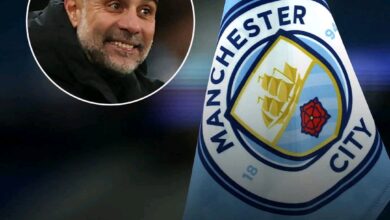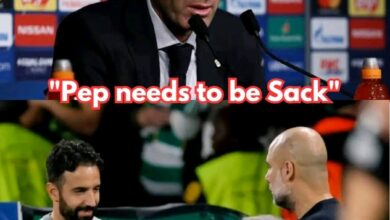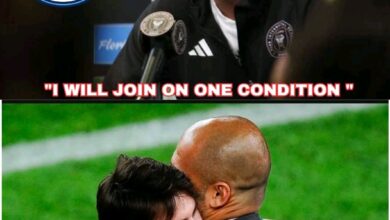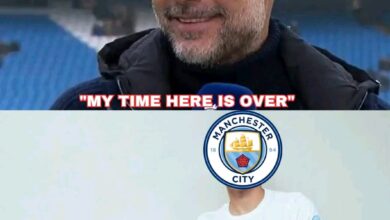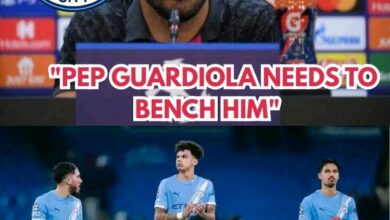Pep Guardiola admits making Manchester City selection mistake ‘after 10 minutes’ against Southampton

In a rare moment of tactical introspection following Manchester City’s disappointing 0-0 draw against Southampton, manager Pep Guardiola openly admitted to what he believes was a critical error in his team selection—one that became apparent to him just minutes into the match. The celebrated tactician, known for his meticulous approach to game preparation, conceded that his initial setup lacked the width necessary to break down Southampton’s determined defensive structure.
“Unfortunately we couldn’t score,” Guardiola stated in his post-match interview with BBC Radio Manchester, his frustration evident despite his measured tone. “Our rhythm in the second-half was better especially because we had wingers. In the first-half we could not do it.”
The admission came after City struggled to create meaningful chances against a Southampton side threatened with the unwanted distinction of becoming statistically the worst team in Premier League history. Despite sitting at the bottom of the table and already confirmed for relegation, the Saints put on a resolute defensive display that confounded Manchester City’s typically fluid attacking movements.
Most tellingly, Guardiola revealed the speed with which he recognized his tactical miscalculation: “After 10, 15 minutes I said we need wingers here in that game because we could not expect the game we were playing. And it is what it is.”
This candid assessment offers a fascinating glimpse into the real-time decision-making process of one of football’s most analytical minds. That Guardiola identified the need for greater width so early in the proceedings yet was unable to sufficiently address it speaks to both Southampton’s determined defensive organization and the constraints of in-game tactical adjustments.
Southampton’s Defensive Masterclass: Frustrating the Champions
What makes this result particularly notable is the context surrounding Southampton’s season. Prior to this match, the Saints had been in danger of recording the lowest points total in Premier League history, with Derby County’s infamous 11-point 2007/08 campaign serving as the benchmark for top-flight futility. The single point earned against Manchester City elevated Southampton beyond this unwanted record, giving their supporters something to celebrate in an otherwise dismal season.
The south coast club employed what has become a familiar strategy against Guardiola’s City—packing players behind the ball in a low defensive block and prioritizing defensive solidity over attacking ambition. While this approach has produced mixed results against City in the past, on this sunny afternoon at St. Mary’s Stadium, it proved remarkably effective.
“We cannot control what the opponent decides [to do], we have to accept it,” Guardiola acknowledged, showing a measure of pragmatic respect for Southampton’s tactical approach. “And breaking them belongs to us. They want to do it in that way, being relegated, so, what can I say? I didn’t expect it.”
This unexpected strategic choice by Southampton—to play with such defensive discipline despite their already-confirmed relegation status—caught Guardiola somewhat off-guard. Many relegated teams, with nothing tangible left to play for, opt to play with greater freedom and attacking intent. Southampton manager Simon Rusk instead chose to organize his side into what effectively became a fortified 11-man defensive unit whenever City approached the penalty area.
City center-back Ruben Dias was reportedly left fuming with this approach, suggesting after the match that Southampton were “not even trying anything”—a sentiment that reflects both frustration at City’s inability to break through and perhaps a certain professional disdain for what might be perceived as excessively negative tactics.
The Haaland Factor: Fitness Concerns and Finding Rhythm
Another significant element in City’s attacking inefficiency was the performance of striker Erling Haaland. The Norwegian marksman was making his first start following a five-week absence due to an ankle injury sustained during the FA Cup quarter-final against Bournemouth. While his return to the starting lineup represented a boost for City on paper, the reality of reintegrating a player of Haaland’s specific physical profile proved challenging.
Guardiola offered insight into Haaland’s condition, noting: “He’s been four, five weeks off! Today he played 97 minutes. He’s not a player like Phil [Foden] who needs only few training sessions to be fit, he moves his body and needs rhythm.”
This observation highlights the delicate balance required when managing elite athletes returning from injury. Unlike the naturally agile Foden, whose technical prowess allows him to regain match sharpness relatively quickly, Haaland’s game relies heavily on explosive power, timing of runs, and physical presence—attributes that typically require competitive minutes to fully restore.
The Norwegian striker, who has been a transformative force for City since his arrival, found himself largely isolated against Southampton’s compact defense. Without the sharp movement and clinical finishing that have become his hallmarks, City’s attack lacked its usual cutting edge in the final third.
Guardiola’s comments suggest a longer-term view regarding Haaland’s condition, adding: “But we have three games and go for it!” This indicates the manager’s belief that the striker will progressively regain his match fitness during the crucial closing fixtures of the season.
Champions League Implications: Points Dropped at Critical Juncture
The timing of this stalemate poses significant questions for Manchester City’s ambitions. With the Premier League season entering its final stages, every point becomes increasingly valuable in the race for UEFA Champions League qualification. The draw leaves City needing positive results from their remaining two league fixtures to secure their place among Europe’s elite next season.
This situation represents an unexpected pressure point for a club that has typically secured Champions League qualification with games to spare in recent seasons. That City find themselves in this position speaks to both the increased competitiveness at the top end of the Premier League and perhaps a slight regression in their own consistency this campaign.
The dropped points against Southampton—a team anchored to the bottom of the table—will undoubtedly be viewed as a missed opportunity when the season’s accounts are settled. For a team of City’s caliber and aspirations, these are precisely the fixtures that championship credentials are built upon converting reliably into victories.
The draw also comes at a time when City are balancing multiple competitive priorities. With an FA Cup Final against Crystal Palace on the horizon, Guardiola must now carefully consider how to manage his squad’s physical and mental resources across these crucial remaining fixtures.
Tactical Adjustments: The Need for Width Against Low Blocks
Perhaps the most intriguing technical insight from Guardiola’s post-match comments was his immediate recognition of the need for natural wingers against Southampton’s defensive setup. This acknowledgment highlights a fundamental principle in breaking down deep-lying defensive structures: the necessity of stretching the opposition horizontally to create gaps in their defensive organization.
“We miss some players in the final third, we need players for crosses into the box because they defend 11 players in the 18-yard box, it’s not easy,” Guardiola explained. This assessment points to a specific tactical requirement when facing ultra-defensive opponents—the ability to deliver quality crosses from wide areas to create opportunities against packed central defensive zones.
City’s initial setup appeared to lack the natural width required to stretch Southampton’s defensive block effectively. Without genuine wingers hugging the touchlines, City’s attack became predictably centralized, playing into the hands of Southampton’s congested defensive strategy.
This tactical shortcoming represents a rare oversight from Guardiola, who has built his reputation on meticulous preparation and tactical adaptability. His admission that he recognized the need for adjustment after just 10-15 minutes suggests he may have underestimated Southampton’s commitment to their defensive approach or overestimated his team’s ability to play through congested central areas.
The challenges City faced against Southampton’s low block are not unique to this fixture. Throughout Guardiola’s tenure, some of City’s most difficult moments have come against teams employing similar ultra-defensive strategies. The inability to convert territorial dominance into clear scoring opportunities has occasionally emerged as an Achilles’ heel for a team otherwise renowned for their attacking fluency.
Selection Dilemmas: Implications for the FA Cup Final
With an FA Cup Final against Crystal Palace looming, Guardiola now faces significant selection decisions. The performances against Southampton may influence his thinking regarding the starting lineup at Wembley, particularly concerning how to approach what will likely be another defensively organized opponent.
The manager’s comments about needing wingers against Southampton could signal a potential tactical approach for the cup final. Crystal Palace, while possessing more attacking threat than Southampton, are also known for their disciplined defensive structure under their management. The width that Guardiola found lacking against Southampton could prove equally essential at Wembley.
Additionally, questions remain about Haaland’s optimal usage in the final. While the Norwegian completed nearly the full match against Southampton, his performance suggested he remains short of peak condition. Guardiola must weigh the benefits of giving his star striker another full match to build fitness against the potential advantages of alternative attacking configurations.
This represents Guardiola’s third consecutive FA Cup Final with Manchester City, highlighting the club’s remarkable consistency in cup competitions under his stewardship. However, the Southampton result serves as a timely reminder that even the most meticulously prepared teams can struggle when their tactical approach doesn’t align with the specific challenges presented by opponents.
Broader Context: City’s Season in Balance
As Manchester City enter the final stages of the 2024/25 season, they find themselves in the unusual position of still having significant work to do to achieve their minimum seasonal objectives. The draw against Southampton exemplifies the fine margins at elite level football—a single tactical miscalculation, even recognized early, can have substantial consequences.
The pressure to secure Champions League qualification through their remaining league fixtures will now intensify. For a club of City’s stature and financial model, participation in Europe’s premier club competition is considered essential rather than aspirational. The unexpected difficulty in breaking down the Premier League’s bottom club raises questions about City’s current form as they approach these crucial fixtures.
Simultaneously, the FA Cup Final offers an opportunity for silverware that would provide a tangible reward for the season’s efforts. Guardiola’s impressive record in domestic cup competitions suggests City will be well-prepared for the Wembley showpiece, despite the frustrations experienced on the south coast.
The balance between these twin objectives—securing Champions League qualification and adding another trophy to the cabinet—will test Guardiola’s resource management and tactical flexibility in the coming weeks. His rare public admission of a selection mistake against Southampton indicates both his honesty as a coach and perhaps a determination to avoid similar missteps in the season’s remaining fixtures.
Player Management: Fitness and Form Concerns
Beyond the tactical considerations, Guardiola must also manage the physical condition of his squad during this congested final phase of the season. Haaland’s return represents a significant boost, but as the manager acknowledged, the striker requires competitive minutes to regain his sharpness.
Similarly, other key players may be experiencing the accumulated fatigue of a demanding season. The inability to break down Southampton’s defense could partially reflect a broader issue of physical and mental freshness as the campaign reaches its conclusion.
Guardiola’s comments suggest he views the remaining three fixtures—two Premier League matches and the FA Cup Final—as an integrated block rather than isolated challenges. His reference to Haaland having “three games” to regain rhythm indicates a holistic approach to player management during this crucial period.
This perspective aligns with Guardiola’s established philosophy of viewing seasons as complete campaigns rather than disconnected individual matches. The Southampton result, while disappointing in isolation, becomes part of a broader preparation process for the season’s conclusion.
Conclusion: Learning from Tactical Missteps
Pep Guardiola’s admission that he identified a selection error just minutes into the Southampton match offers a fascinating glimpse into the self-critical mindset of an elite manager. Rather than deflecting responsibility or focusing exclusively on his players’ execution, Guardiola acknowledged his own role in the tactical approach that ultimately proved insufficient.
This transparency reflects both professional integrity and a commitment to continuous improvement that has characterized Guardiola’s managerial career. By publicly identifying the lack of natural width as a critical factor in City’s offensive struggles, he demonstrates the analytical clarity that has underpinned his success.
As Manchester City navigate the season’s final challenges, the lessons from the Southampton stalemate will likely inform their tactical approach. The recognition that certain opponents require specific offensive structures—in this case, genuine wing play against deep defensive blocks—represents valuable insight for the remaining fixtures.
For supporters and neutral observers alike, Guardiola’s tactical admission provides a compelling reminder that football at the highest level remains a game of fine margins and continuous adaptation. Even the most successful managers and teams must constantly evolve their approaches based on the specific challenges presented by each opponent.
With Champions League qualification still to secure and an FA Cup Final on the horizon, how effectively Guardiola applies the lessons from the Southampton draw may ultimately define Manchester City’s 2024/25 campaign. His willingness to acknowledge and learn from tactical missteps suggests that, whatever the outcome, it won’t be for lack of honest self-assessment.






